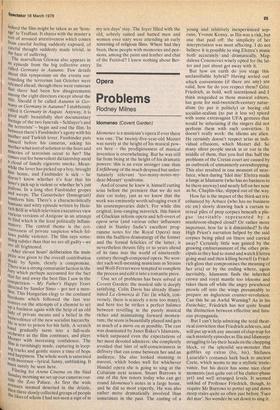Opera
Problems
Rodney Milnes
ldomeneo (Covent Garden) Idomeneo is a musician's opera if ever there was one. The twenty-five-year-old Mozart was surely at the height of his musical powers here — the prodigiousness of musical invention is overwhelming. But he was still far from being at the height of his dramatic powers: this is an even stronger case than Entfiihrung of the much despised but unfortunately relevant 'too-many-notes-my, dear-Mozart' syndrome.
And of course he knew it, himself cutting arias before the premiere that we do not dare cut today, just as we know that the work was eminently worth salvaging even if his contemporaries didn't. For while this original, lone-ranging maverick, this fusion of Gluckian reform opera and left-overs of opera seria (and various other influences cited in Stanley Sadie's excellent programme notes for the Royal Opera) may miss the faultless dramaturgy of the former and the formal felicities of the latter, it nevertheless thrusts fifty or so years ahead of its time into the world of nineteenthcentury through-composed opera. No wonder such well-meaning musicians as Strauss and Wolf-Ferrari were tempted to complete the process and edit it into a romantic piece.
One set of problems has been solved at Covent Garden: the musical side is deeply satisfying. Cohn Davis has already illuminated La clemenza di Tito (in which, conversely, there is scarcely a note too many), and here too he strikes a perfect balance between revelling in the purely musical
riches and maintaining forward momentum; the score is beautifully played and gets as much of a move on as possible. The cast was dominated by Janet Baker's Idamante, which surpassed even the expectations of her most devoted admirers: she completely avoided that hint of self-consciousness in delivery that can come between her and an
audience. She also looked stunning in travesti, which bodes well for whichever Handel opera she is going to sing at the
Coliseum next season. Stuart Burrows is
one of the few tenors today who can get round Idomeneo's notes in a large house,
and he did so most expertly. He was also rather more dramatically involved than sometimes in the past. The casting of a young and relatively inexperienced soprano, Yvonne Kenny, as Ilia was a risk, but one that paid off: the simplicity of her interpretation was most affecting. I do not believe it is possible to sing Elettra's music both accurately and dramatically. Magdalena Cononovici wisely opted for the latter and just about got away with it
But how on earth do you stage this unclassifiable hybrid? Having sorted out which conventions (if there are any) are valid, how far do you respect them? Giitz Friedrich, as bold, well intentioned and I think misguided as those musical editors, has gone for mid-twentieth-century naturalism (to put it politely) or boring old socialist-realism (to put it less so) spiced with some extravagant UFA gestures that would be infuriating if the singers did not perform them with such conviction. It doesn't really work: the idioms are alien. He certainly doesn't respect arias as individual effusions, which Mozart did. So many silent people sneak in or out in the middle of them, that you feel that half the problems of the Cretan court are caused by an outbreak of unmannerly eavesdropping. This also resulted in one moment of nearfarce, when during 'Idol mio' Elettra made a lunge at Idamante (who has no business to be there anyway) and nearly fell on her nose as he, Chaplin-like, slipped out of the way.
How far is the impact of the third-act trio enhanced by Arbace (who has no business etc etc) slowly drawing back a curtain to reveal piles of prop corpses beneath a plague inevitably represented by a mushroom-shaped cloud? Or rather more important, how far is it diminished? Is the High Priest's narration helped by the said corpses being piled on litters and carried away? Certainly little was gained by the growing embarrassment of the other principals as they had to stand and watch Eleltra going mad and then killing herself (a Friedrich gloss that compromises the meaning of her aria) or by the ending where, again inevitably, Idamante finds the inherited crown and royal mantle too irksome and takes them off while the angry priesthood prowls off into the wings presumably to prepare an inglorious counter-revolution. Can this be an Awful Warning? As in his Freischiitz, Friedrich has not quite found the distinction between effective and fatuous propaganda.
But I can't help admiring the total theatrical conviction that Friedrich achieves, and will put up with any amount of clap-trap for such masterly episodes as Ilia and Idamarttc struggling to lay their heads on the chopping block, or the splendid sea-monster that
gobbles up extras (bis, bis). Stefanos Lazaridis's costumes hark back to ancient
Crete, which seems to me a stylistic irrele vance, but his decor has some nice clear moments (not quite out of his clutter-phase yet) and well arranged levels. It seemed unkind of Professor Friedrich, though, to require Mr Burrows to potter up and down steep stairs quite so often just before `Fuor del mar'. No wonder he sat down to sing it.


































 Previous page
Previous page